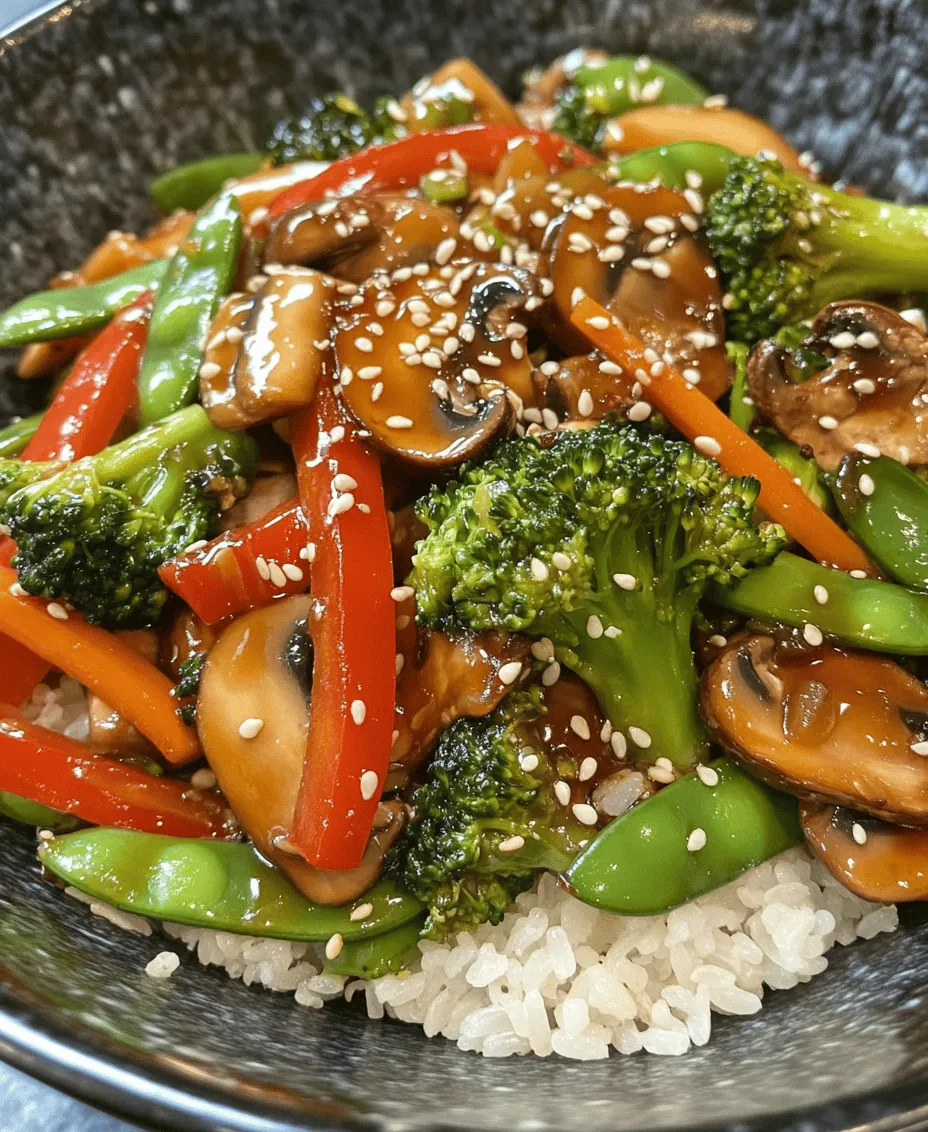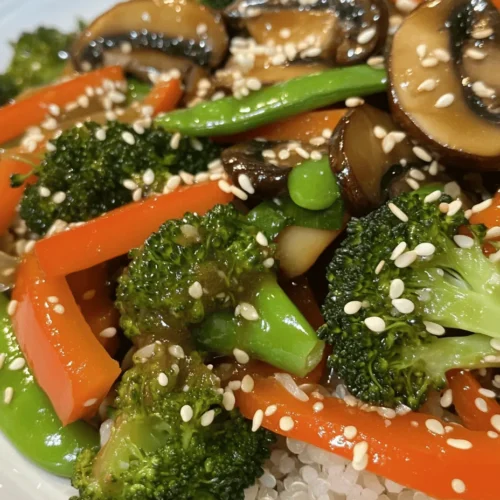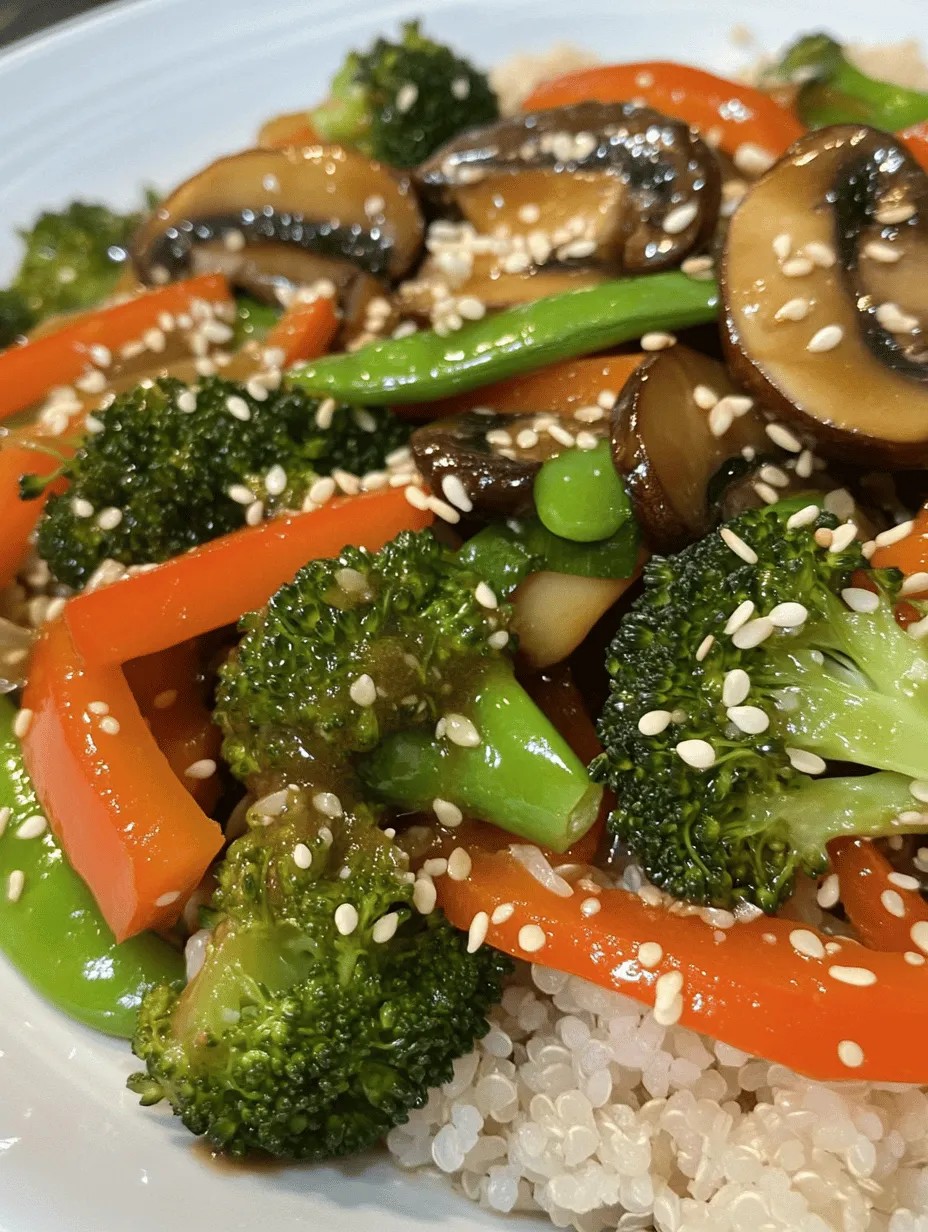Introduction
In today’s fast-paced world, finding quick and nutritious meal options is essential for maintaining a balanced diet. Many people struggle to prepare meals that are both healthy and satisfying, often turning to convenience foods that can be lacking in nutrients. A veggie stir-fry emerges as a vibrant and colorful dish that not only meets the need for speed but also delivers a punch of flavor and nutrition. This Quick & Colorful Veggie Stir-Fry showcases a medley of fresh vegetables, packed with essential nutrients and flavors, all ready in just 20 minutes.
The beauty of a stir-fry lies in its versatility and the ability to customize it according to your dietary preferences. This dish is perfect for busy weeknights when you want to whip up something healthy without sacrificing taste or quality. In this article, we will delve into the details of preparing this delightful dish, exploring its nutritional benefits, cooking techniques, and variations to suit different dietary needs.
Understanding the Appeal of Stir-Fry
The Nutritional Benefits of Veggie Stir-Fry
One of the key advantages of a veggie stir-fry is the wide array of essential vitamins and minerals that the ingredients provide. Each vegetable in the stir-fry contributes unique health benefits, making it an excellent choice for those looking to enhance their diet with nutrient-dense foods.
– Colorful Meals for Nutritional Variety: The vibrant colors in your stir-fry are not just visually appealing; they also signal the variety of nutrients contained within. Different colored vegetables provide different vitamins and antioxidants. For instance, orange carrots are rich in beta-carotene, while green broccoli is high in vitamin K and calcium. Eating a variety of colors ensures that you are covering a broad spectrum of nutrients that your body needs to function optimally.
– Incorporating Plant-Based Meals: As more people look to reduce their meat consumption for health or environmental reasons, incorporating plant-based meals into your diet has never been more relevant. A veggie stir-fry is an ideal entry point for those exploring plant-based eating. It’s hearty enough to satisfy meat-lovers while appealing to vegetarians and vegans alike.
Why Quick Meals Matter
In the hustle and bustle of modern life, quick meals play a crucial role in maintaining a healthy lifestyle. The following points emphasize the significance of preparing fast yet nutritious meals:
– Balancing a Busy Lifestyle: Many individuals juggle work, family, and personal commitments, leaving little time for meal preparation. Quick meals, like this veggie stir-fry, allow you to enjoy home-cooked food without spending hours in the kitchen. By focusing on one-pan or one-wok dishes, you can minimize cleanup time, too.
– Time-Saving Techniques: Meal prep can significantly reduce cooking time. By dedicating a bit of time on the weekend to wash, chop, and store your vegetables ahead of time, you can easily throw together a delicious meal on busy weekdays. In this recipe, we will cover efficient cutting techniques and preparation tips to streamline the cooking process.
– Healthy and Satisfying Options: Quick meals can be healthy and filling. This veggie stir-fry is a prime example of how you can create a nutritious dish in just a few minutes without compromising on flavor or satisfaction. By using fresh ingredients and wholesome seasonings, you can ensure that your quick meals are both nourishing and delightful.
Ingredient Breakdown
Fresh Vegetables and Their Health Benefits
The foundation of any great veggie stir-fry lies in the selection of fresh vegetables. Here’s a closer look at some of the key ingredients that contribute to both the flavor and the health benefits of this dish:
– Broccoli: Often hailed as a nutritional powerhouse, broccoli is loaded with vitamins C and K, as well as fiber. Its antioxidant properties have been linked to cancer-fighting capabilities, making it a staple in healthy diets.
– Red Bell Pepper: This colorful vegetable is an excellent source of vitamin C, which supports immune health and skin integrity. Red bell peppers are also rich in antioxidants, adding both flavor and nutrition to your stir-fry.
– Snap Peas: Snap peas offer a delightful crunch and are a good source of fiber and protein. They help to keep you feeling full longer and provide essential vitamins, including A, C, and K.
– Carrots: Rich in beta-carotene, carrots are vital for maintaining good vision and skin health. Their natural sweetness balances the savory elements of the stir-fry, enhancing the overall taste.
– Mushrooms: Low in calories yet high in flavor, mushrooms are a great addition to any veggie dish. They are known for their immune-boosting properties and add an earthy depth to the stir-fry.
– Green Onions: These aromatic vegetables not only enhance the flavor of your dish but also come packed with nutrients. They are a good source of vitamins A, C, and K, and their mild flavor makes them a perfect garnish.
Essential Aromatics
To elevate the flavor of your stir-fry, incorporating aromatics such as garlic and ginger is essential. These ingredients not only enhance the taste but also offer numerous health benefits:
– Garlic: Known for its distinctive flavor, garlic is also recognized for its anti-inflammatory and immune-boosting properties. It can help lower blood pressure and improve cholesterol levels, making it a beneficial addition to your meals.
– Ginger: This aromatic spice adds a warm, zesty flavor to dishes and is well-known for its digestive benefits. Ginger has anti-inflammatory properties that can help alleviate nausea and improve gut health.
The Sauce: Balancing Flavor and Nutrition
No stir-fry is complete without a flavorful sauce that ties all the ingredients together. Here are some key components to consider:
– Soy Sauce vs. Tamari: While traditional soy sauce adds a salty umami flavor, tamari serves as a gluten-free alternative. Both options can enhance the taste of your stir-fry, so choose based on your dietary needs.
– Sesame Oil: This oil is essential for achieving authentic stir-fry flavor. A little sesame oil goes a long way in imparting a nutty aroma that complements the freshness of the vegetables. It also contains healthy fats that contribute to overall well-being.
Step-by-Step Guide to Making Quick & Colorful Veggie Stir-Fry
Preparing Your Ingredients
The first step in making a delicious veggie stir-fry is ensuring that all your ingredients are prepped and ready to go. Here are some essential tips for preparing your vegetables:
– Uniform Cutting: For even cooking, it’s important to cut your vegetables into uniform pieces. This ensures that everything cooks at the same rate, preventing some ingredients from becoming overcooked while others remain raw.
– Efficient Washing and Prepping: To save time, wash your vegetables in advance. Consider using a salad spinner to dry leafy greens or rinsed vegetables efficiently. Having everything cleaned and prepped ahead of time means you can quickly toss everything in the pan when you’re ready to cook.
– Organization is Key: Arrange your prepped ingredients in order of cooking time. Start with those that take longer to cook, such as broccoli and carrots, and have quicker-cooking items like snap peas and green onions ready to add later in the process.
With your ingredients prepped and organized, you’re all set to start cooking your Quick & Colorful Veggie Stir-Fry. In the following sections, we will dive deeper into the step-by-step cooking process and offer tips for achieving the perfect stir-fry every time. Stay tuned for an exciting culinary adventure that celebrates the flavors and benefits of fresh vegetables!

Cooking Techniques for Perfect Stir-Fry
Choosing the Right Skillet or Wok
When it comes to stir-frying, the choice of cookware is crucial for achieving that perfect texture and flavor. A traditional wok is preferred in many Asian cuisines due to its unique shape, which allows for even heat distribution and provides a large cooking surface. However, if you don’t have a wok, a heavy-bottomed skillet will work just as well. Look for materials that conduct heat efficiently, such as cast iron or stainless steel. Non-stick pans are also an option, but be cautious with high heat, as they can degrade over time.
Ideal Cooking Temperatures for Vegetables
The key to a successful stir-fry is cooking your vegetables at the right temperature. High heat is essential for achieving that characteristic stir-fry sear. Preheat your wok or skillet until it’s smoking slightly, then add your oil. Once the oil shimmers, it’s time to add your vegetables. Cooking them quickly at a high temperature allows for a crispy texture while retaining their vibrant colors and nutrients.
Stir-Frying vs. Sautéing: Understanding the Difference
While both stir-frying and sautéing involve cooking food quickly at high heat, they differ in technique and purpose. Stir-frying typically requires constant movement of the ingredients in the pan, allowing for even cooking and preventing burning. This method also allows you to add ingredients in stages, ensuring that each component is cooked to perfection. Sautéing, on the other hand, involves cooking food in a bit of oil over moderate heat, with less frequent stirring. Understanding this difference can help achieve the desired results in your Quick & Colorful Veggie Stir-Fry.
Saucing It Right
How to Achieve the Perfect Consistency with Cornstarch
Cornstarch is a secret weapon in stir-fry cooking, often used to thicken sauces for a glossy finish. To achieve the ideal consistency, mix equal parts of cornstarch and cold water to create a slurry. Add this mixture to your stir-fry towards the end of cooking, allowing it to thicken as it heats. Be sure to stir continuously to prevent clumping. This technique will elevate your dish, giving it a restaurant-quality appearance and texture.
Tips for Balancing Flavors with Soy Sauce and Sesame Oil
Flavor balance is essential in creating a delicious stir-fry. Soy sauce provides the umami depth, while sesame oil adds a nutty richness. Start with a tablespoon of soy sauce and a teaspoon of sesame oil, adjusting to your taste. For additional complexity, consider adding a splash of rice vinegar or a dash of chili sauce for heat. Always taste your sauce before serving; this ensures that the flavors are harmonious and tailored to your palate.
Serving Suggestions
Pairing with Rice or Quinoa
A stir-fry is often complemented by a base of rice or quinoa. Both options offer their own nutritional benefits, making them popular choices. Rice is a staple in many diets, providing a good source of carbohydrates. Brown rice, in particular, is higher in fiber and nutrients than white rice. Quinoa, though technically a seed, is a complete protein, containing all nine essential amino acids, which makes it an excellent choice for vegetarians and vegans.
To properly cook rice or quinoa for your stir-fry, rinse the grains under cold water to remove excess starch. For rice, use a ratio of 2:1 water to rice, bringing it to a boil, then reducing to a simmer until tender. For quinoa, use a 2:1 ratio as well, but remember to let it simmer for about 15 minutes. Both should be fluffy and light, and ready to absorb the flavors of your stir-fry.
Creative Garnishes
Presentation can elevate your dish from ordinary to extraordinary. Sprinkle sesame seeds over your finished stir-fry for added crunch and visual appeal. They provide a delightful nutty flavor that complements the dish perfectly. Additionally, consider garnishing with fresh herbs like cilantro or green onions to enhance freshness. Other toppings such as crushed nuts, chili flakes, or a drizzle of sweet chili sauce can add texture and a pop of flavor that makes your meal even more enjoyable.
Variations and Customizations
Protein Additions
For those looking to boost their protein intake, adding tofu, chicken, or shrimp to your stir-fry can be an excellent option. Tofu is a fantastic plant-based source of protein that absorbs the flavors of the dish beautifully. Press and cube it before cooking for optimal texture. If you prefer chicken or shrimp, cut them into bite-sized pieces and cook them first in the pan until they are thoroughly cooked through, then remove them and add them back once your veggies are nearly done.
Cooking times will vary: tofu can take around 5-7 minutes, while chicken and shrimp typically require about 4-6 minutes, depending on their size. Ensure your protein reaches a safe internal temperature; chicken should be cooked to 165°F (75°C) and shrimp should turn pink and opaque.
Adapting for Dietary Preferences
One of the many beauties of the Quick & Colorful Veggie Stir-Fry is its versatility. For a vegan or vegetarian version, simply stick with an array of colorful veggies and tofu. If you’re looking for gluten-free adaptations, substitute regular soy sauce with tamari or coconut aminos. This maintains the savory flavor profile without gluten, making it suitable for those with dietary restrictions. Additionally, you can experiment with different vegetables based on what’s in season or what you have in your fridge, ensuring every stir-fry can be unique.
Storing and Reheating Leftovers
Best Practices for Storage
Storing leftover stir-fry properly can help maintain its flavor and texture. Allow the stir-fry to cool to room temperature before transferring it to airtight containers. It can be stored in the refrigerator for up to three days. For longer storage, consider freezing it. To freeze stir-fry, portion it into freezer-safe containers or bags, ensuring to remove as much air as possible to prevent freezer burn. It can last in the freezer for up to three months.
Reheating Techniques
When it comes time to enjoy your leftovers, reheating them correctly is key to preserving their original texture. The microwave is a quick option; cover the dish to retain moisture and heat in short intervals, stirring occasionally. For a better texture, consider reheating in a skillet over medium heat. Add a splash of water or broth to help steam the vegetables and prevent them from drying out. If you have fresh ingredients like green onions or additional sauce, adding them while reheating can refresh the dish, making it taste almost as good as new.
Conclusion
In summary, the Quick & Colorful Veggie Stir-Fry stands out as a versatile and nutritious dish that caters to a variety of dietary preferences and schedules. With its vibrant array of vegetables and simple preparation, this meal is perfect for anyone looking to enjoy a healthy, homemade dinner without spending hours in the kitchen. Whether you’re a busy professional, a parent, or simply someone who values good food, this stir-fry is sure to become a staple in your weekly meal rotation. Embrace the ease and delight of cooking with this colorful dish that nourishes both the body and the soul. The customizable nature of this recipe ensures that it can be adapted to suit personal tastes and dietary needs, making it a truly inclusive option for all. So, gather your favorite vegetables, follow these tips, and savor every colorful bite!


